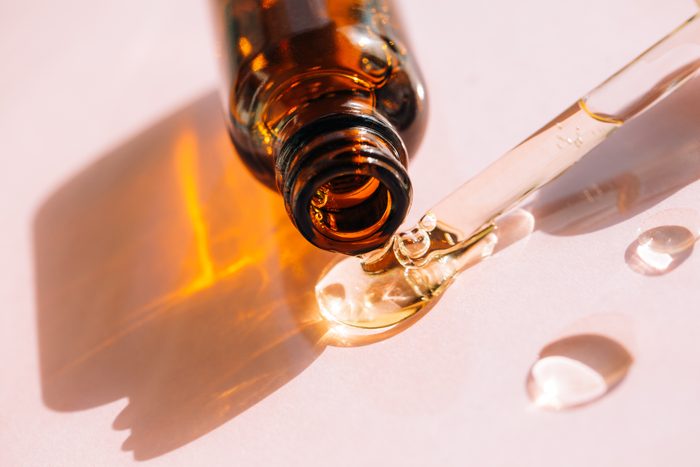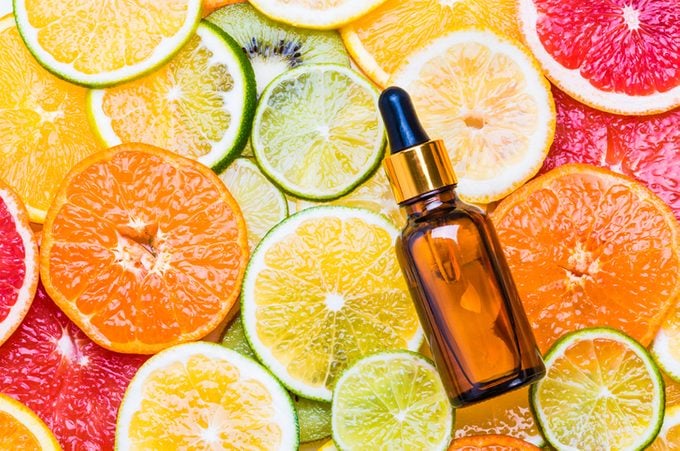Do Discoloration Correcting Serums Actually Work?
Updated: Feb. 17, 2023

The short answer is yes, so long as you use them correctly. Learn how discoloration and dark spot correction serums work.
Our editors and experts handpick every product we feature. We may earn a commission from your purchases.
As the sun is starting to poke out from between the winter clouds, many of us are venturing outside again. After all, there’s absolutely nothing like the feeling of warm sun on your skin. However, with the change of seasons comes different skincare concerns. While winter may be all about moisturizing, spring and summer are the seasons of sun protection to prevent discoloration and burns.
Hundreds of products exist to treat discoloration, from chemical peels to laser treatments to specialized serums. But which products are legit, according to dermatologists? Here is everything you need to know about discoloration and those popular “discoloration serums” before you buy.
What is Discoloration of the Skin?
Skin discoloration is more commonly referred to as “hyperpigmentation” by beauty experts. According to Howard Sobel, MD, founder of Sobel Skin and dermatologist and dermatologic surgeon at Lenox Hill Hospital, “Hyperpigmentation describes dark patches of skin that can form in small or large areas anywhere on the body.” You can recognize hyperpigmentation by the presence of brown spots, much like large freckles, and Sobel breaks down hyperpigmentation into a few different types: “melasma, age spots, and post-inflammatory hyperpigmentation.”
What Causes Skin Discoloration?
As there are many different types of hyperpigmentation, there are also many different causes. According to the Mayo Clinic, Medical News Today, and Everyday Health, hyperpigmentation is typically caused one or multiple of the following factors:
- Sun exposure
- Hormonal changes (as with pregnancy or some contraceptives)
- Inflammation (rashes, acne, eczema)
- Blue light from screens and electronics
- Certain medications
- Certain medical conditions, such as Cushing’s disease or Addison’s disease
Additionally, those with darker skin tones may experience hyperpigmentation to a greater degree than those with lighter skin tones. This is because their skin is already creating higher levels of melanin.
How Can I Treat Skin Discoloration?

According to dermatologists, there are numerous different ways to treat hyperpigmentation. Let’s investigate each individually:
Serums
Hartman says that “[t]he serum step is a great one in the skincare routine to target the darker trouble spots.” In general, seek out serums with antioxidants and/or key ingredients specifically targeting hyperpigmentation.
Heather D. Rogers, MD, founder and CEO of Doctor Rogers Restore, and co-founder of Modern Dermatology recommends vitamin C. Board-certified dermatologist and founder of Skin Wellness Dermatology, Corey L. Hartman, MD, FAAD, adds that niacinamide, cysteamine, and tranexamic acid may also help particularly resistant dark spots.
For darker skin tones, the American Academy of Dermatology specifically recommends vitamin C, azelaic acid, glycolic acid and kojic acid, none of which require a prescription.
When using serums, be sure to start slow so as not to irritate the skin.
Chemical Exfoliants and Retinoids
Another key part of reducing hyperpigmentation is encouraging skin cell turnover. To do so, dermatologists recommend using chemical exfoliants, such as AHAs and BHAs, and/or a gentle retinol. These ingredients “unglue” dead skin cells, so that new healthy cells can form and serums can penetrate the skin better.
Exfoliants and retinoids are likely to dry out the skin over time, so be sure to pair them with a quality moisturizer, such as one containing hyaluronic acid, which will draw water into the skin for a plumping effect.
Chemical Peels, Laser Treatments, and Prescriptions
These are both more extreme hyperpigmentation solutions, and should never be attempted without the explicit approval of a doctor, as they can lead to inflammation, reddening, or blistering if performed too frequently, according to Sobel. Furthermore, while they offer decent temporary solutions, they require consistent use to be effective.
If you are still struggling with hyperpigmentation after trying the gentler, non-prescription options above, you may want to see a dermatologist to get a topical medication like hydroquinone, which is considered the gold standard for fading dark spots.
How Can I Prevent Skin Discoloration?
As they say, an ounce of prevention is worth a pound of cure. So, start reducing hyperpigmentation before it even occurs by applying a zinc- or iron oxide-based sunscreen with 50+ SPF at least three times a day, even when it’s cloudy.
Additionally, do your best not to pick at your skin, which can cause scarring and bacterial spread, increasing the likelihood of inflammation leading to hyperpigmentation.
Lastly, while caring for your skin and preventing skin damage is critical to overall health, never forget that there is absolutely nothing wrong with having some hyperpigmentation. It’s completely natural and in most cases, not cause for medical alarm. Do what feels best for you in treating it (or not!) with the awareness that affordable, effective products are available.
Straightforward brands such as The Ordinary and The INKEY List, and drugstore favorites like CeraVe and Neutrogena, are realiable budget-friendly options.
















